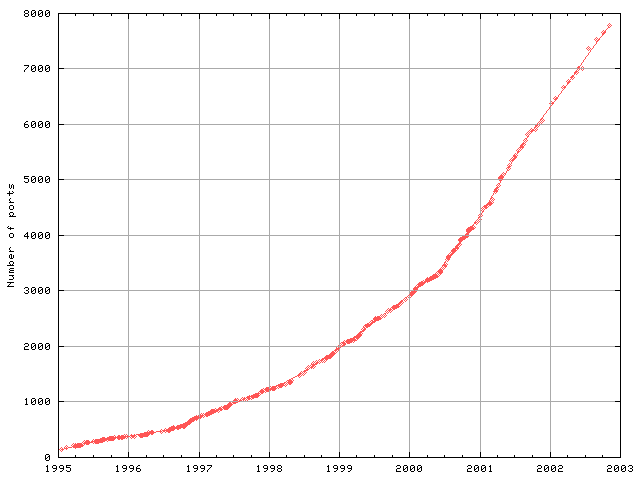Chapter 8 Sub-projects
- Table of Contents
- 8.1. The Ports Subproject
- 8.2. The FreeBSD Documentation Project
Sub-projects are formed to reduce the amount of communication needed to coordinate the group of developers. When a problem area is sufficiently isolated, most communication would be within the group focusing on the problem, requiring less communication with the groups they communicate with than were the group not isolated.
8.1. The Ports Subproject
A ``port'' is a set of meta-data and patches that are needed to fetch, compile and install correctly an external piece of software on a FreeBSD system. The amount of ports have grown at a tremendous rate, as shown by the following figure.
Figure 8-1 is taken from the FreeBSD web site. It shows the number of ports available to FreeBSD in the period 1995 to 2003. It looks like the curve has first grown exponentionally, and then since the middle of 2001 grown linerly.
As the external software described by the port often is under continued development, the amount of work required to maintain the ports is already large, and increasing. This has led to the ports part of the FreeBSD project gaining a more empowered structure, and is more and more becoming a sub-project of the FreeBSD project.
Ports has its own core team with the Ports Manager as its leader, and this team can appoint committers without FreeBSD Core's approval. Unlike in the FreeBSD Project, where a lot of maintenance frequently is rewarded with a commit bit, the ports sub-project contains many active maintainers that are not committers.
Unlike the main project, the ports tree is not branched. Every release of FreeBSD follows the current ports collection and has thus available updated information on where to find programs and how to build them. This, however, means that a port that makes dependencies on the system may need to have variations depending on what version of FreeBSD it runs on.
With an unbranched ports repository it is not possible to guarantee that any port will run on anything other than -CURRENT and -STABLE, in particular older, minor releases. There is neither the infrastructure nor volunteer time needed to guarantee this.
For efficiency of communication, teams depending on Ports, such as the release engineering team, have their own ports liaisons.
